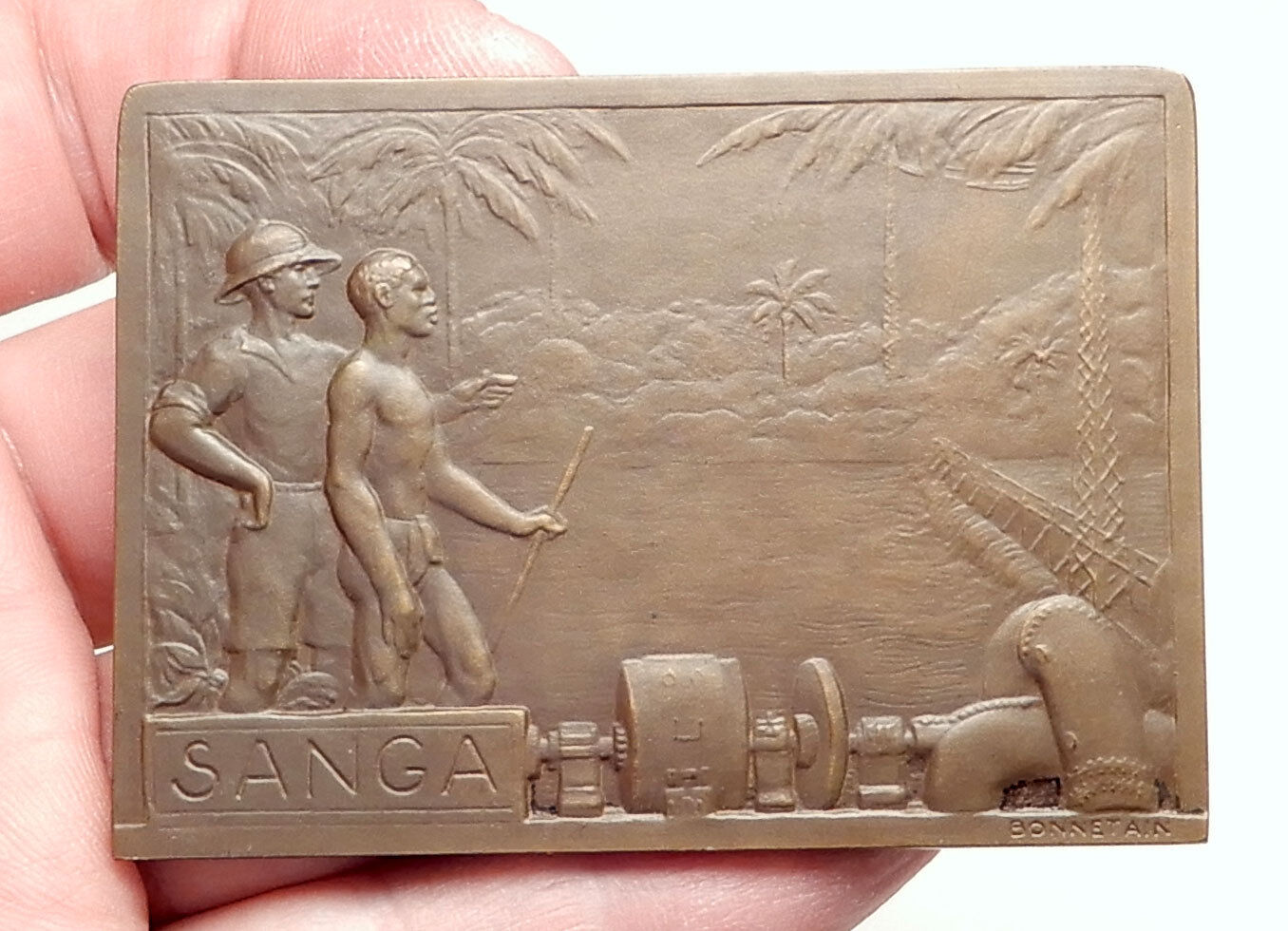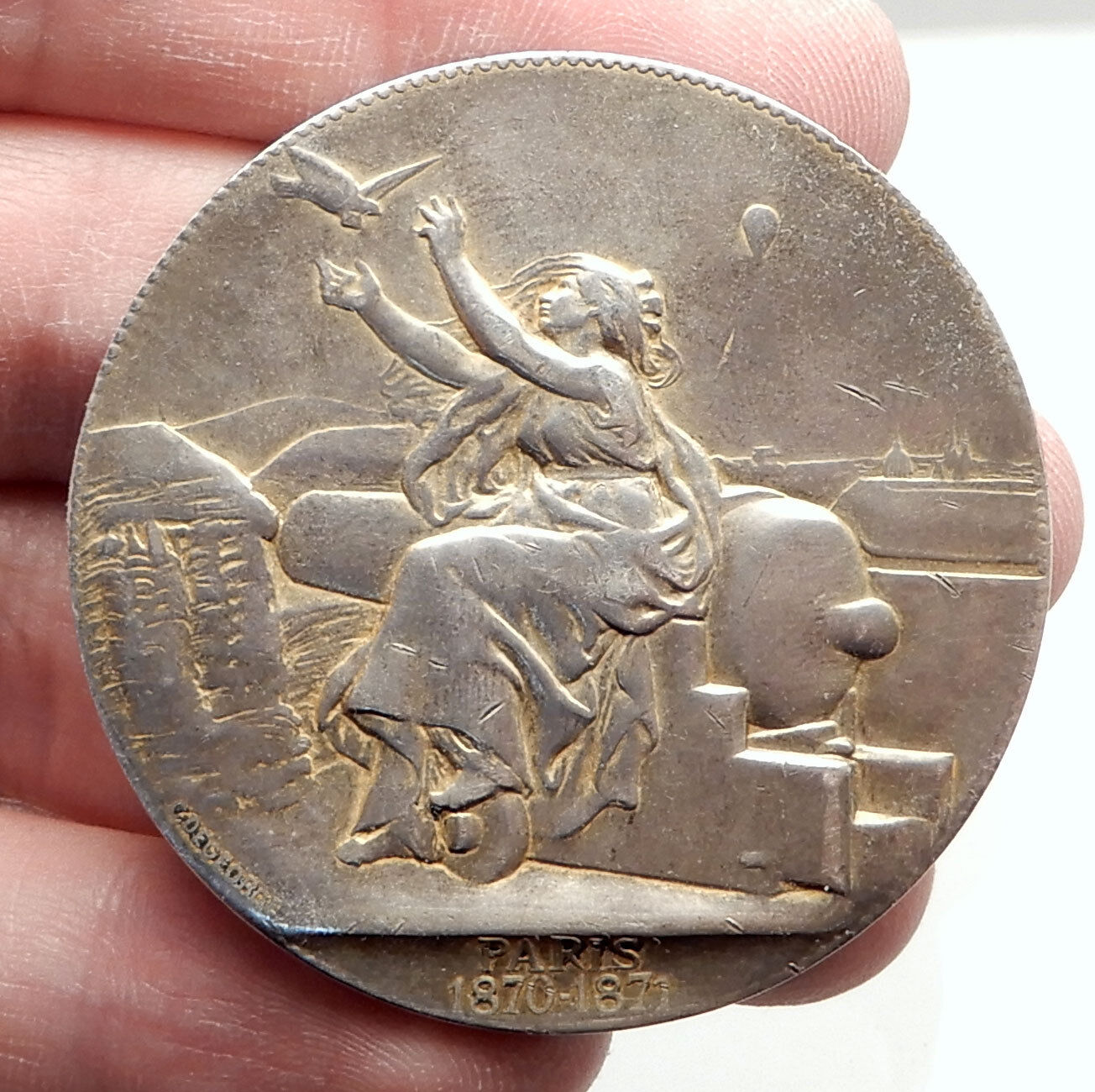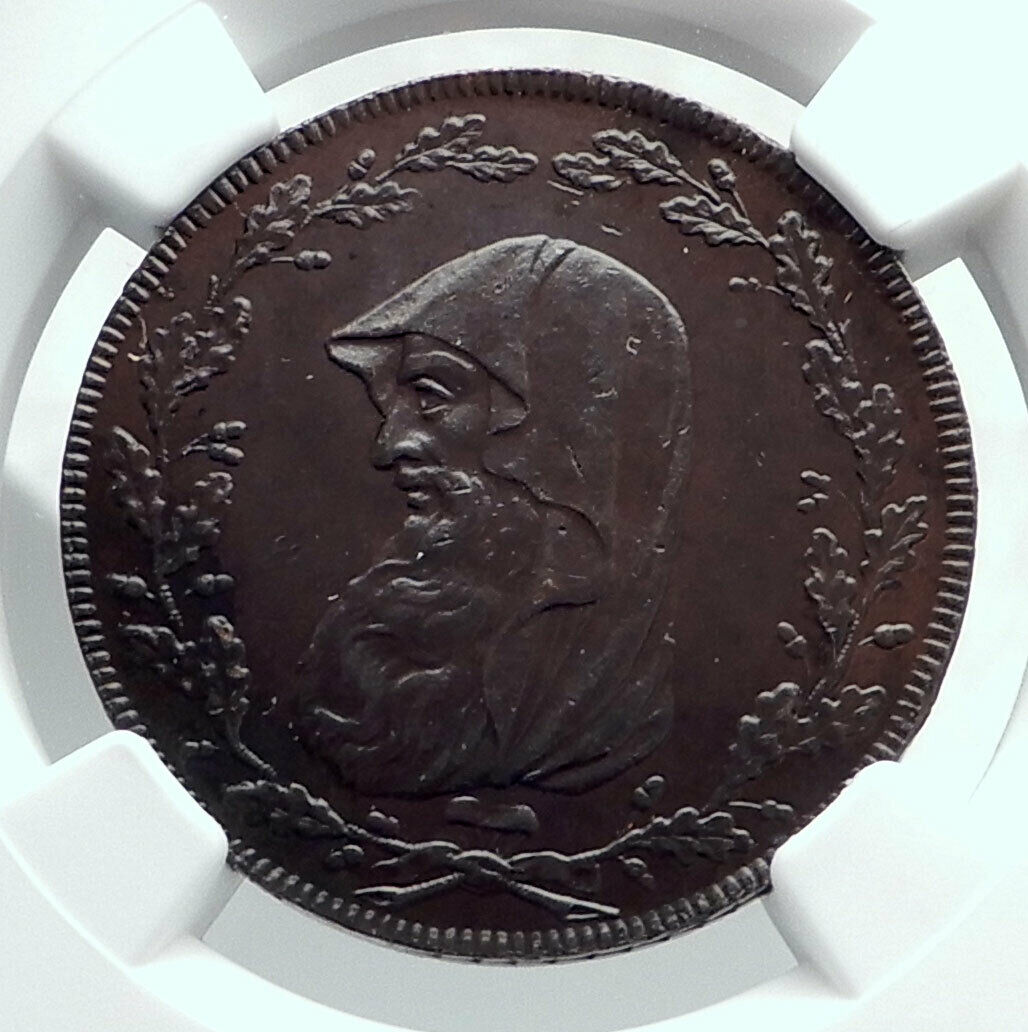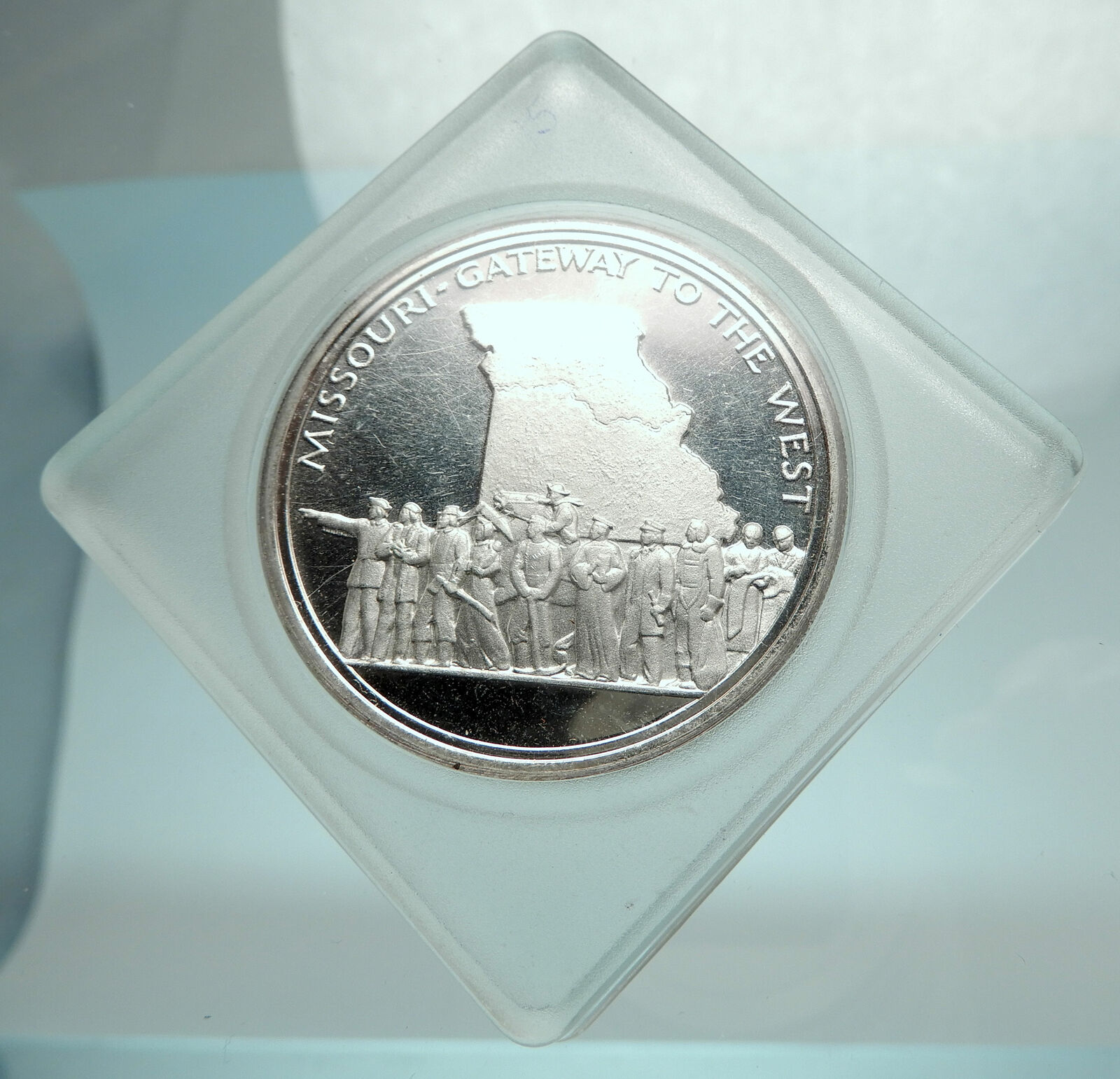|
Sweden – Dag Hjalmar Tribute Medal
1961 Bronze Medal 68mm (158.61 grams)
DAG HAMMARSKJOLD, Dag facing 1/4 left.
AN INSPIRING LIFE OF SERVICE TO HIS FELLOW MEN LEADERSHIP IN WORLD AFFAIRS SACRIFICE IN THE CALL OF DUTY 1905 1961 Hero of Peace, Circle behind olive branch.
Edge Lettering:
GENUINE BRONZE ROBBINS, ATILEB 920
You are bidding on the exact item pictured, provided with a Certificate of Authenticity and Lifetime Guarantee of Authenticity.
 Dag Hjalmar Agne Carl Hammarskjöld (29 July 1905 – 18 September 1961) was a Swedish economist and diplomat who served as the second Secretary-General of the United Nations. As of 2021, he remains the youngest person to have held the post, having been only 47 years old when he was appointed in 1953. Dag Hjalmar Agne Carl Hammarskjöld (29 July 1905 – 18 September 1961) was a Swedish economist and diplomat who served as the second Secretary-General of the United Nations. As of 2021, he remains the youngest person to have held the post, having been only 47 years old when he was appointed in 1953.
Hammarskjöld’s tenure was characterized by efforts to strengthen the newly-formed UN both internally and externally. He led initiatives to improve morale and organizational efficiency while seeking to make the UN more responsive to global issues. He presided over the creation of the first UN peacekeeping forces in Egypt and Congo, and personally intervened to diffuse or resolve diplomatic crises. Hammarskjöld’s second term was cut short when he died in a plane crash while en route to cease-fire negotiations during the Congo Crisis.
Hammarskjöld was and remains well regarded internationally as a capable diplomat and administrator, and his efforts to resolve various global crises led to him being the only posthumous recipient of the Nobel Peace Prize. He is considered one of the two best UN secretaries-generals, along with his successor U Thant, and his appointment has been hailed as one of the most notable successes for the organization. U.S. President John F. Kennedy called Hammarskjöld “the greatest statesman of our century.”
 Sweden, officially the Kingdom of Sweden, is a Scandinavian country in Northern Europe. It borders Norway and Finland, and is connected to Denmark by a bridge-tunnel across the Öresund. At 450,295 square kilometres (173,860 sq mi), Sweden is the third-largest country in the European Union by area, with a total population of over 9.8 million. Sweden consequently has a low population density of 21 inhabitants per square kilometre (54/sq mi), with the highest concentration in the southern half of the country. Approximately 85% of the population lives in urban areas. Southern Sweden is predominantly agricultural, while the north is heavily forested. Sweden is part of the geographical area of Fennoscandia. Sweden, officially the Kingdom of Sweden, is a Scandinavian country in Northern Europe. It borders Norway and Finland, and is connected to Denmark by a bridge-tunnel across the Öresund. At 450,295 square kilometres (173,860 sq mi), Sweden is the third-largest country in the European Union by area, with a total population of over 9.8 million. Sweden consequently has a low population density of 21 inhabitants per square kilometre (54/sq mi), with the highest concentration in the southern half of the country. Approximately 85% of the population lives in urban areas. Southern Sweden is predominantly agricultural, while the north is heavily forested. Sweden is part of the geographical area of Fennoscandia.
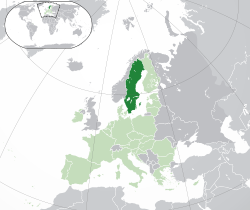
 Germanic peoples have inhabited Sweden since prehistoric times, emerging into history as the Geats/Götar and Swedes/Svear and constituting the sea peoples known as the Norsemen. Sweden emerged as an independent and unified country during the Middle Ages. In the 17th century, it expanded its territories to form the Swedish Empire, which became one of the great powers of Europe until the early 18th century. Swedish territories outside the Scandinavian Peninsula were gradually lost during the 18th and 19th centuries, beginning with the annexation of present-day Finland by Russia in 1809. The last war in which Sweden was directly involved was in 1814, when Norway was militarily forced into personal union. Germanic peoples have inhabited Sweden since prehistoric times, emerging into history as the Geats/Götar and Swedes/Svear and constituting the sea peoples known as the Norsemen. Sweden emerged as an independent and unified country during the Middle Ages. In the 17th century, it expanded its territories to form the Swedish Empire, which became one of the great powers of Europe until the early 18th century. Swedish territories outside the Scandinavian Peninsula were gradually lost during the 18th and 19th centuries, beginning with the annexation of present-day Finland by Russia in 1809. The last war in which Sweden was directly involved was in 1814, when Norway was militarily forced into personal union.
Since then, Sweden has been at peace, maintaining an official policy of neutrality in foreign affairs. The union with Norway was peacefully dissolved in 1905, leading to Sweden’s current borders. Though it was formally neutral through both world wars, Sweden engaged in humanitarian efforts, such as taking in refugees from German-occupied Europe. After the end of the Cold War, Sweden joined the European Union on 1 January 1995, but declined NATO membership.
Today, Sweden is a constitutional monarchy and a parliamentary democracy, with the Monarch as the head of state. The capital city is Stockholm, which is also the most populous city in the country. Legislative power is vested in the 349-member unicameral Riksdag. Executive power is exercised by the Government, chaired by the Prime Minister. Sweden is a unitary state, currently divided into 21 counties and 290 municipalities.
Sweden maintains a Nordic social welfare system that provides universal health care and tertiary education for its citizens. It has the world’s eighth-highest per capita income and ranks highly in numerous metrics of national performance, including quality of life, health, education, protection of civil liberties, economic competitiveness, equality, prosperity and human development. Sweden has been a member of the European Union since 1 January 1995, but declined Eurozone membership following a referendum. It is also a member of the United Nations, the Nordic Council, Council of Europe, the World Trade Organization and the Organisation for Economic Co-operation and Development (OECD).
|







 Dag Hjalmar Agne Carl Hammarskjöld (29 July 1905 – 18 September 1961) was a Swedish economist and diplomat who served as the second Secretary-General of the United Nations. As of 2021, he remains the youngest person to have held the post, having been only 47 years old when he was appointed in 1953.
Dag Hjalmar Agne Carl Hammarskjöld (29 July 1905 – 18 September 1961) was a Swedish economist and diplomat who served as the second Secretary-General of the United Nations. As of 2021, he remains the youngest person to have held the post, having been only 47 years old when he was appointed in 1953. Sweden, officially the Kingdom of Sweden, is a Scandinavian country in Northern Europe. It borders Norway and Finland, and is connected to Denmark by a bridge-tunnel across the Öresund. At 450,295 square kilometres (173,860 sq mi), Sweden is the third-largest country in the European Union by area, with a total population of over 9.8 million. Sweden consequently has a low population density of 21 inhabitants per square kilometre (54/sq mi), with the highest concentration in the southern half of the country. Approximately 85% of the population lives in urban areas. Southern Sweden is predominantly agricultural, while the north is heavily forested. Sweden is part of the geographical area of Fennoscandia.
Sweden, officially the Kingdom of Sweden, is a Scandinavian country in Northern Europe. It borders Norway and Finland, and is connected to Denmark by a bridge-tunnel across the Öresund. At 450,295 square kilometres (173,860 sq mi), Sweden is the third-largest country in the European Union by area, with a total population of over 9.8 million. Sweden consequently has a low population density of 21 inhabitants per square kilometre (54/sq mi), with the highest concentration in the southern half of the country. Approximately 85% of the population lives in urban areas. Southern Sweden is predominantly agricultural, while the north is heavily forested. Sweden is part of the geographical area of Fennoscandia.
 Germanic peoples have inhabited Sweden since prehistoric times, emerging into history as the Geats/Götar and Swedes/Svear and constituting the sea peoples known as the Norsemen. Sweden emerged as an independent and unified country during the Middle Ages. In the 17th century, it expanded its territories to form the Swedish Empire, which became one of the great powers of Europe until the early 18th century. Swedish territories outside the Scandinavian Peninsula were gradually lost during the 18th and 19th centuries, beginning with the annexation of present-day Finland by Russia in 1809. The last war in which Sweden was directly involved was in 1814, when Norway was militarily forced into personal union.
Germanic peoples have inhabited Sweden since prehistoric times, emerging into history as the Geats/Götar and Swedes/Svear and constituting the sea peoples known as the Norsemen. Sweden emerged as an independent and unified country during the Middle Ages. In the 17th century, it expanded its territories to form the Swedish Empire, which became one of the great powers of Europe until the early 18th century. Swedish territories outside the Scandinavian Peninsula were gradually lost during the 18th and 19th centuries, beginning with the annexation of present-day Finland by Russia in 1809. The last war in which Sweden was directly involved was in 1814, when Norway was militarily forced into personal union.

